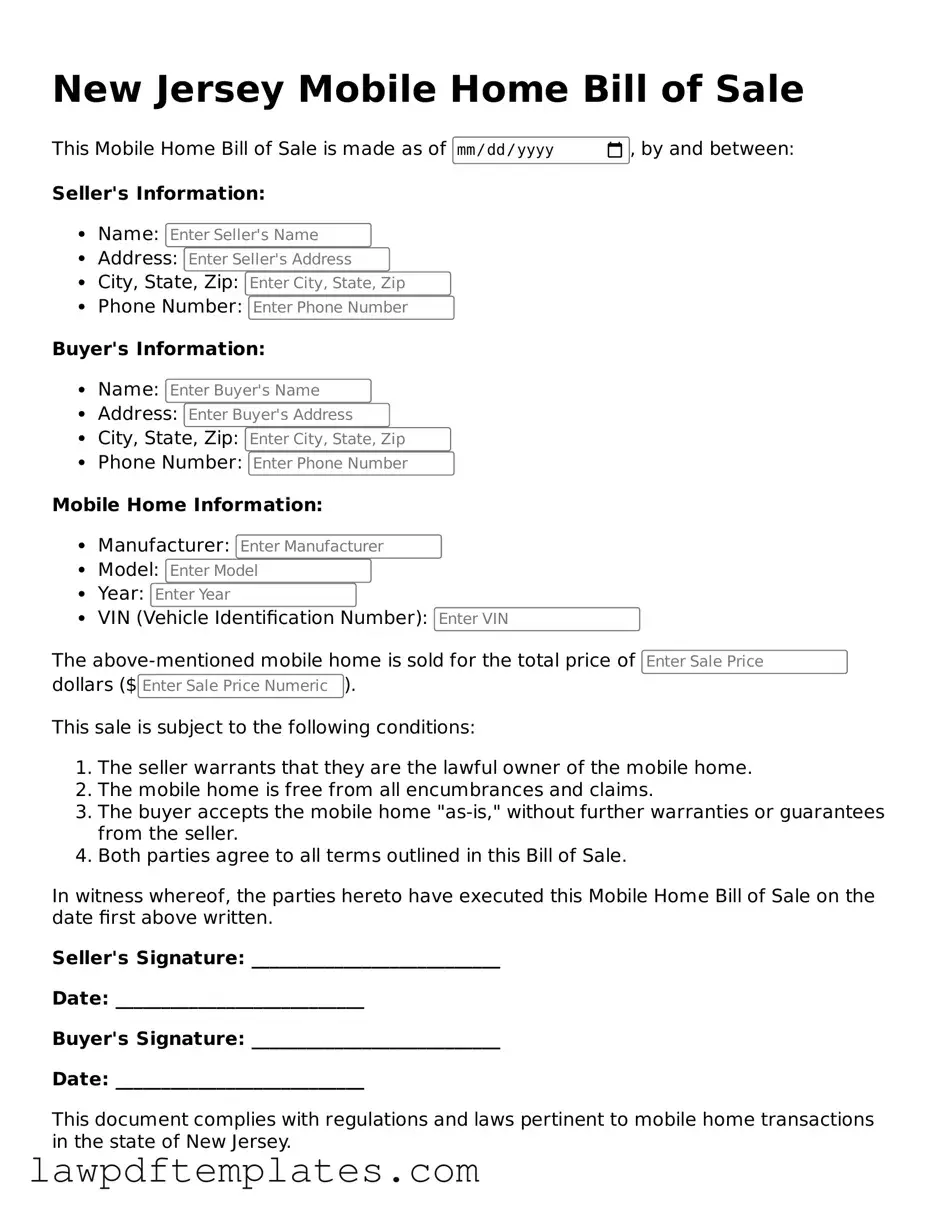Free Mobile Home Bill of Sale Template for the State of New Jersey
Form Breakdown
| Fact Name | Description |
|---|---|
| Purpose | The New Jersey Mobile Home Bill of Sale form serves as a legal document that records the sale and transfer of ownership of a mobile home from one party to another. |
| Governing Law | This form is governed by the New Jersey Statutes, specifically Title 46, which pertains to the sale and transfer of personal property. |
| Required Information | Essential details include the names and addresses of both the seller and buyer, a description of the mobile home, and the sale price. |
| Signatures | Both parties must sign the form to validate the transaction, ensuring that the sale is legally binding and recognized by the state. |
Sample - New Jersey Mobile Home Bill of Sale Form
New Jersey Mobile Home Bill of Sale
This Mobile Home Bill of Sale is made as of , by and between:
Seller's Information:
- Name:
- Address:
- City, State, Zip:
- Phone Number:
Buyer's Information:
- Name:
- Address:
- City, State, Zip:
- Phone Number:
Mobile Home Information:
- Manufacturer:
- Model:
- Year:
- VIN (Vehicle Identification Number):
The above-mentioned mobile home is sold for the total price of dollars ($).
This sale is subject to the following conditions:
- The seller warrants that they are the lawful owner of the mobile home.
- The mobile home is free from all encumbrances and claims.
- The buyer accepts the mobile home "as-is," without further warranties or guarantees from the seller.
- Both parties agree to all terms outlined in this Bill of Sale.
In witness whereof, the parties hereto have executed this Mobile Home Bill of Sale on the date first above written.
Seller's Signature: ___________________________
Date: ___________________________
Buyer's Signature: ___________________________
Date: ___________________________
This document complies with regulations and laws pertinent to mobile home transactions in the state of New Jersey.
Common mistakes
Filling out the New Jersey Mobile Home Bill of Sale form can be straightforward, but many individuals make common mistakes that can complicate the transaction. One frequent error is failing to provide accurate information about the mobile home. This includes neglecting to include the correct vehicle identification number (VIN) or the year, make, and model of the mobile home. These details are crucial for proper identification and registration.
Another mistake involves not including the full names and addresses of both the buyer and seller. This information is essential for establishing clear ownership and ensuring that all parties are legally recognized in the transaction. Omitting this information can lead to disputes or difficulties in future transactions.
Some individuals overlook the importance of signatures. Both the buyer and seller must sign the document for it to be legally binding. Failing to obtain the necessary signatures can render the bill of sale invalid, leading to potential legal complications down the line.
Additionally, many people forget to include the date of the sale. This date is significant as it marks the official transfer of ownership. Without it, there could be confusion regarding the timeline of ownership, especially if disputes arise later.
Another common oversight is neglecting to specify the sale price. Clearly stating the amount paid for the mobile home is vital for record-keeping and tax purposes. A lack of clarity in this area can lead to misunderstandings and potential legal issues.
Some individuals fail to provide a clear description of the mobile home’s condition at the time of sale. Including details about any existing damage or repairs needed can protect both parties and help avoid disputes regarding the condition of the mobile home after the sale.
Moreover, not including any warranties or guarantees can also be a mistake. If the seller offers any warranties, these should be explicitly stated in the bill of sale. This helps to clarify the responsibilities of both parties and can prevent future disagreements.
Another error involves not keeping a copy of the completed bill of sale. Both parties should retain a signed copy for their records. This document serves as proof of the transaction and can be important for future reference or if any issues arise.
People sometimes neglect to check for any specific local requirements. Different municipalities may have additional regulations or forms that need to be completed. Failing to comply with local laws can lead to complications in the sale process.
Lastly, individuals may rush through the process without reviewing the completed form for errors. Taking the time to carefully review the document can help catch mistakes before they become problematic. A thorough review ensures that all information is correct and complete, facilitating a smoother transaction.
Discover More Mobile Home Bill of Sale Templates for Specific States
Ohio Bill of Sale Word Template - This form captures a snapshot of the agreed-upon sale, proving beneficial for both parties.
Mobile Home Bill of Sale - A Mobile Home Bill of Sale can serve as evidence in case of legal issues regarding ownership.
For those looking to navigate the sale of goods or property, utilizing a reliable resource like PDF Documents Hub can streamline the process of obtaining a Washington Bill of Sale, ensuring all necessary information is accurately captured for a successful transaction.
Does a Mobile Home Bill of Sale Need to Be Notarized - Using a Mobile Home Bill of Sale can help streamline the buying process by providing accepted standards for documentation.
